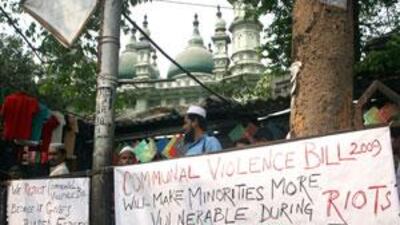KOLKATA // Indian human rights groups, Muslims and Christians have rejected a bill that aims to curb communal violence because they believe it will further victimise minorities during riots rather than protect them. Rights activists had objected to a similar bill on communal violence drafted by the Congress-led coalition government in 2005, leading to its amendment, the Communal Violence (Prevention, Control and Rehabilitation of Victims) Bill 2009, which was cleared by the cabinet in December and is awaiting introduction to parliament.
Activists say the 2009 bill is blighted by the same holes as its 2005 predecessor because it pledges to "empower" local and central authorities in dealing with communal violence. They claim that this essentially gives police and security forces - the majority of whom are Hindu - greater freedom in turning a blind eye to rioting and allows the courts more leeway in prosecuting offenders. "This Communal Violence Bill 2009, if passed, will not only be weak, it will be dangerous," said a statement from the Delhi-based Act Now for Harmony And Democracy (Anhad), a civil-rights group that works with victims of communal violence.
"It will not only fail to secure justice for communal crimes, but will actually strengthen the shield of protection enjoyed by those who plan and sponsor these crimes." Aziz Mubarki, the national secretary of the South Asia Ulema Council in Kolkata, said: "It's a draconian piece of law in the making. It will make Muslims and Christians more vulnerable during riots when a big section of Hindu-majority police and other government officials in command turn communally biased. The 2009 bill must be recalled by the government and redrafted under recommendations from all secular ends."
Inquiries into several Hindu-Muslim and Hindu-Christian riots by civil rights groups and government-appointed commissions in recent decades revealed that minorities bore the brunt of communal violence. For example, the Srikrishna Commission, set up to inquire into the 1992-1993 Mumbai Hindu-Muslim riots, observed that Muslims were the "worst victims" of the violence and blamed police officials and Hindu politicians for facilitating or taking part in riots against minority Muslims.
Following continuous pressure from rights groups, in its Common Minimum Programme in 2004, the government promised to bring in "comprehensive legislation" to fight communal violence. The next year the communal violence bill was introduced in the upper house of parliament. It faced sharp criticism from minorities and others - including jurists, legal activists and riot survivors. The Human Rights Law Network, Janvikas, a citizen's rights group in Gujarat, and Anhad issued a joint statement saying they felt "disappointed with the big holes" in the bill, which was "a complete betrayal" of official promises a year earlier.
This forced the Indian home ministry to send the bill to a parliamentary standing committee for review. While the government incorporated some minor changes recommended by the committee, minorities and activists said the 2009 bill is no different from that of 2005. "Like the previous one, the 2009 bill does not address our concerns about insecurity of the minority victims in riots," said Anhad's executive secretary, Shabnam Hashmi, who has been spearheading a campaign for a "sound and effective" communal violence bill for years.
Ms Hashmi, citing the case of the 2002 riots between Muslims and Hindus in Gujarat, which she said authorities instigated and participated in, said the penal law does not provide for prosecuting or punishing such authorities. "In contrast, it provides legal immunity to these public servants. So one of our basic demands in the bill is command responsibility, which should pin criminal liability to the person, civilian or military, under whose command the crimes took place during communal violence."
Ms Hashmi said civil society must unite to prevent the government from tabling the 2009 bill in parliament. In a letter to the prime minister, Manmohan Singh, this month, John Dayal, the secretary general of the All India Christian Council, said Christians found the 2009 bill ineffective and, he believed, it "will not be able to prevent a Kandhamal from taking place again", referring to Hindu activist-led anti-Christian rioting in Orissa in 2008.
Mr Dayal said his organisation shared the concern of Muslim groups that the bill does not identify the real victims of communal rioting and treats the incidents as spontaneous, without considering that they may have been premeditated or even sponsored by state authorities. It also gives too much power to state government, which, he said, "historically, have occasionally acted in a biased manner".
@Email:foreign.desk@thenational.ae

